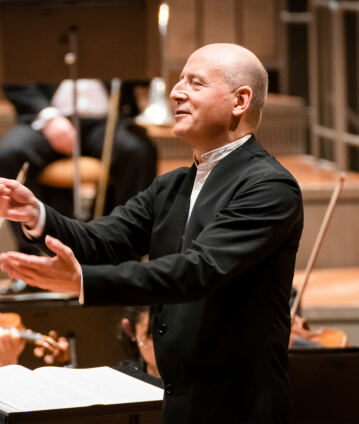Paavo Järvi conducts Berg and Bruckner

In this concert with Paavo Järvi, we experience sensuously delicate tonal beauty, composed by two pioneers of Modernism. Anton Webern’s richly coloured arrangement of a ricercare by Bach is followed by Alban Berg’s Seven Early Songs (soloist: Mojca Erdmann), which capture the tender mood of young love. Bruckner’s Second Symphony concludes the programme – an early work which already has unmistakable Brucknerian power.
The year 1907 was significant for Alban Berg in several respects: The then 22-year-old, who had been a composition student of Arnold Schoenberg since 1904, received the opportunity in the course of these lessons to give a public performance of three of his songs at a student concert. And not only that: he also met his future wife, the beautiful and popular Helene Nahowski, who had a beautiful singing voice. The three works presented, “Nachtigallˮ, “Liebesodeˮ and “Traumgekröntˮ, formed the core of a collection that Berg published under the title Seven Early Songs 21 years later. In it, he revised and orchestrated seven of his early works and brought them together to form a self-contained song cycle. Masterfully instrumented, these pieces, which are sung in this programme by Mojca Erdmann stepping in for Hanna-Elisabeth Müller, convey the intimate, tender, confused and romantic mood of young love. At the same time, the influence of Gustav Mahler, Richard Strauss and Hugo Wolf on the young composer is unmistakable.
In 1877, exactly 30 years before the first public performance of the three Berg songs, Anton Bruckner completed the second version of his Symphony in C minor. In this version of his officially cited Second Symphony, he learned from the experience of the premiere of the first version in October 1873 on the occasion of the Vienna World Fair and another performance in February 1876. Within Bruckner’s oeuvre, this work is still overshadowed by his other symphonies. Less innovative and boldly designed than the First, the Second nevertheless consistently continues the path taken by Bruckner towards his own personal style. First, the main theme arises over the mysterious tremolo that was to become typical of his symphonic beginnings. The thematic blocks separated by general pauses and the collision of contrasting sections are also characteristic features of Bruckner’s very own composition style. What proves to be a special feature of this symphony: Bruckner makes repeated references to his F minor Mass, whose successful world premiere coincided exactly with the time when the first version was written.
The Berliner Philharmoniker performed Bruckner’s Symphony No. 2 for the first time in October 1902 under the direction of its then chief conductor Arthur Nikisch, who was a great admirer of the composer. However, the piece is rarely performed in Philharmoniker concerts. It was last played in April 2007 under the direction of Seiji Ozawa. This season, Paavo Järvi conducts the Second Symphony, the first time he is presenting a work by Anton Bruckner with the Berliner Philharmoniker.
© 2019 Berlin Phil Media GmbH
Related interviews
Artists
Our recommendations
- Paavo Järvi and Igor Levit perform Beethoven’s Piano Concerto No. 5
- Paavo Järvi conducts Beethoven and Hindemith
- Yuja Wang’s debut with the Berliner Philharmoniker
- Paavo Järvi and Stefan Dohr
- Paavo Järvi conducts Beethoven and a world premiere
- 2018 Europakonzert from Bayreuth with Paavo Järvi and Eva-Maria Westbroek